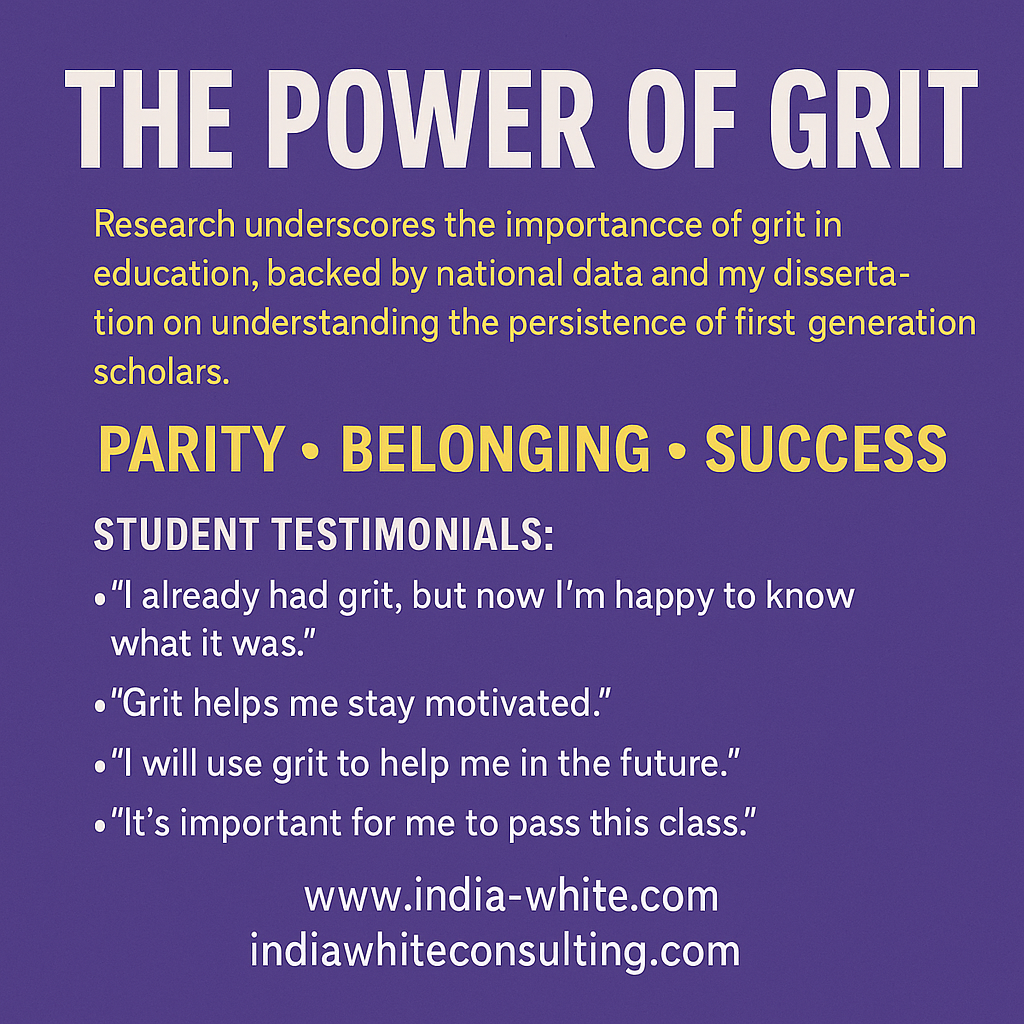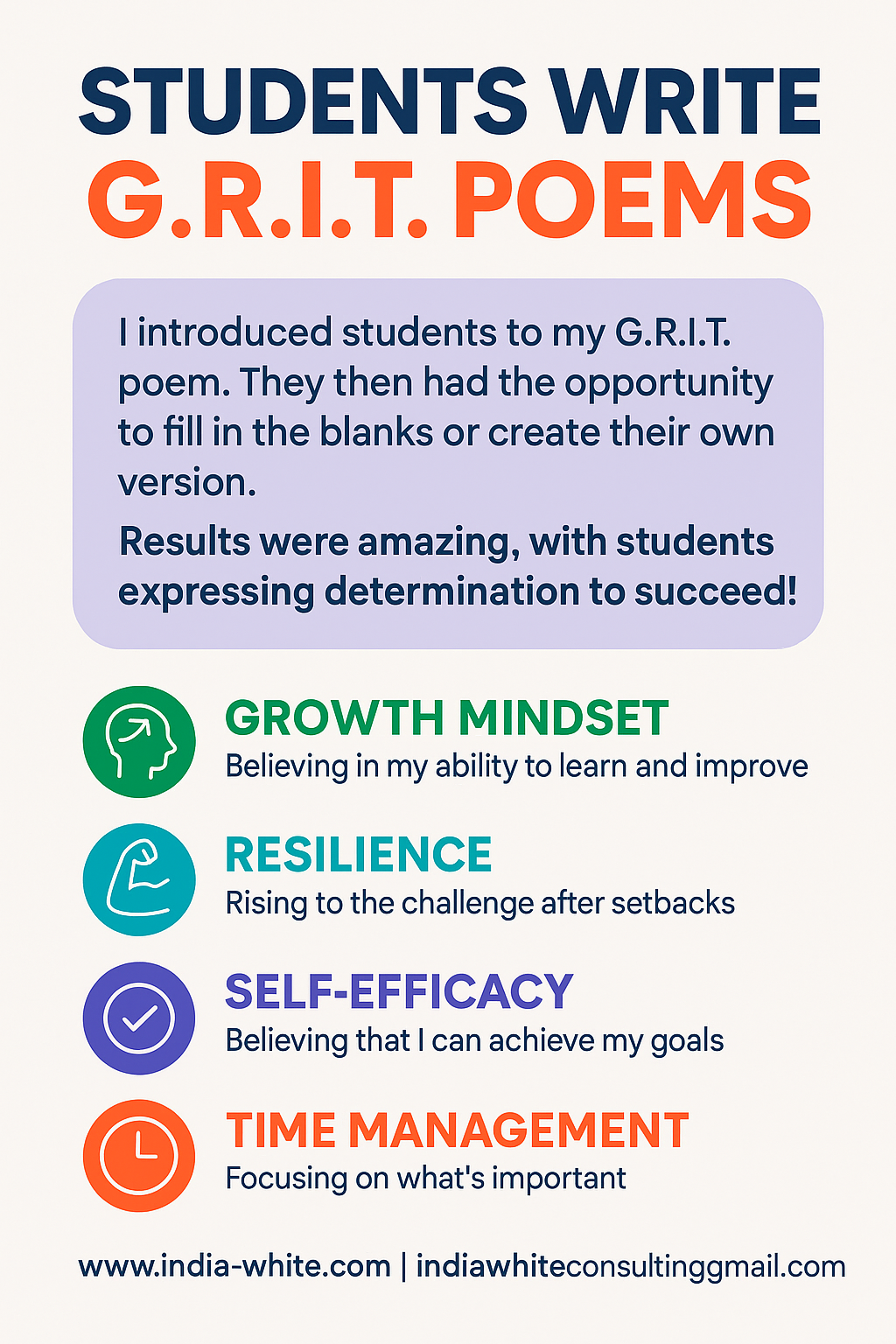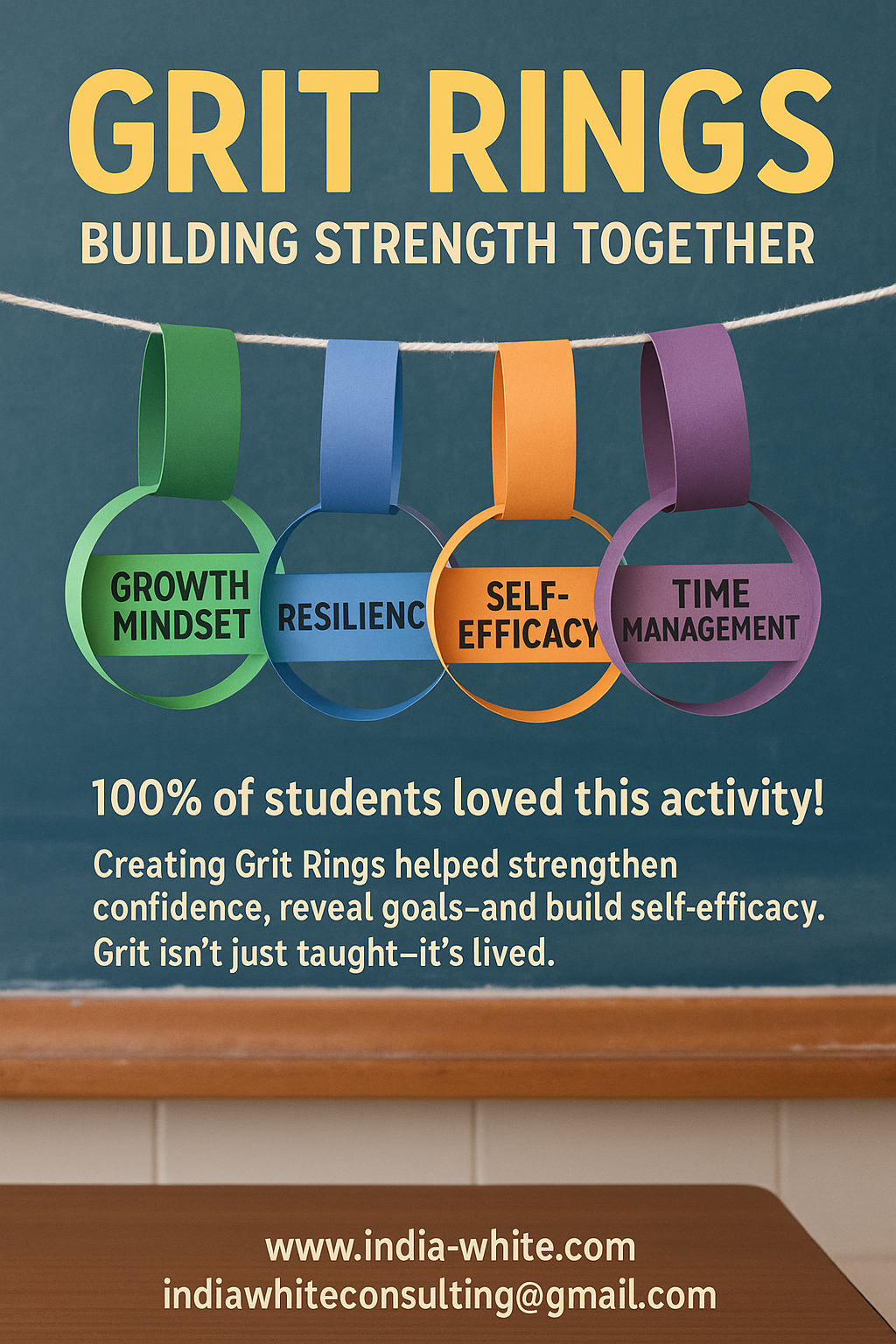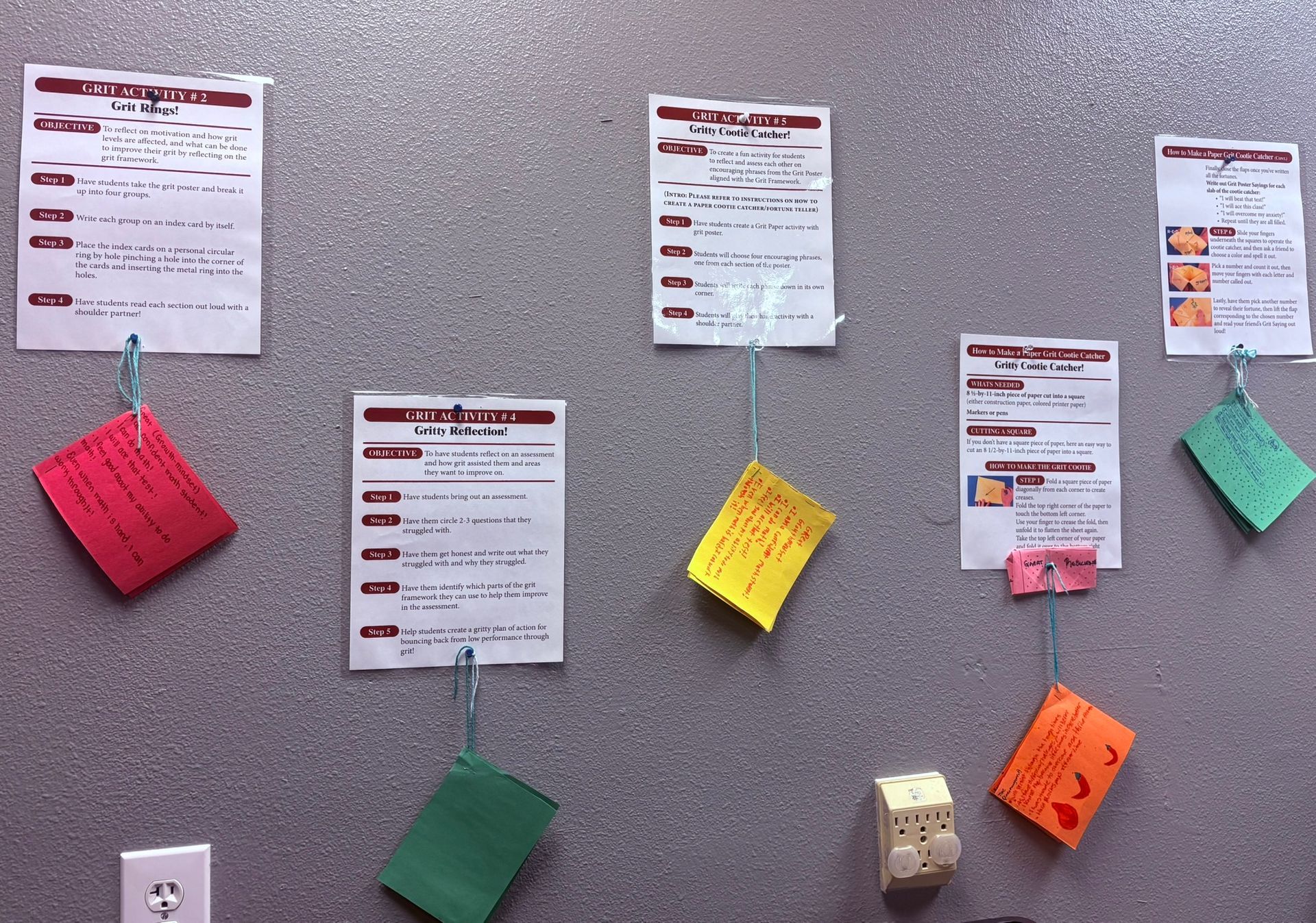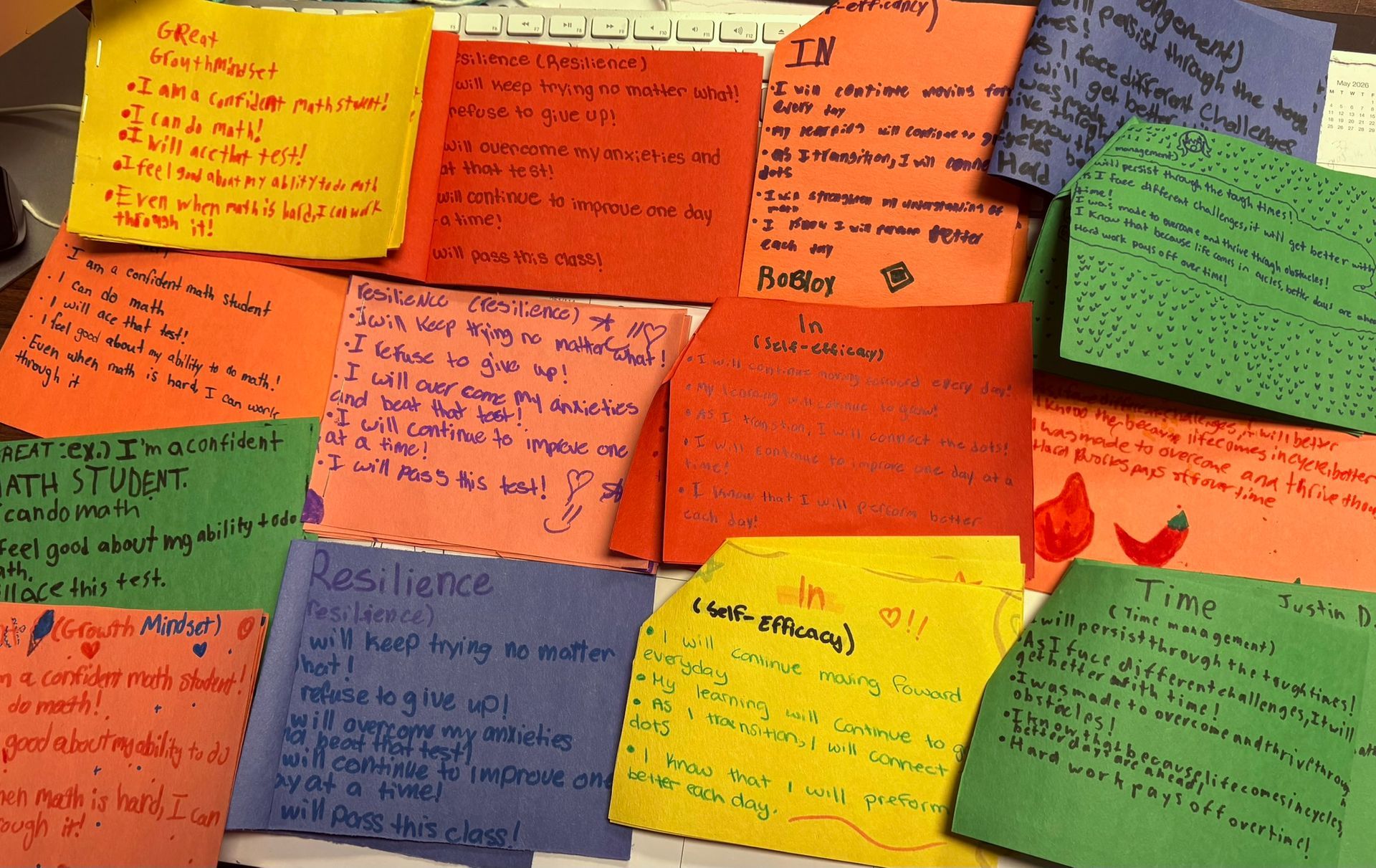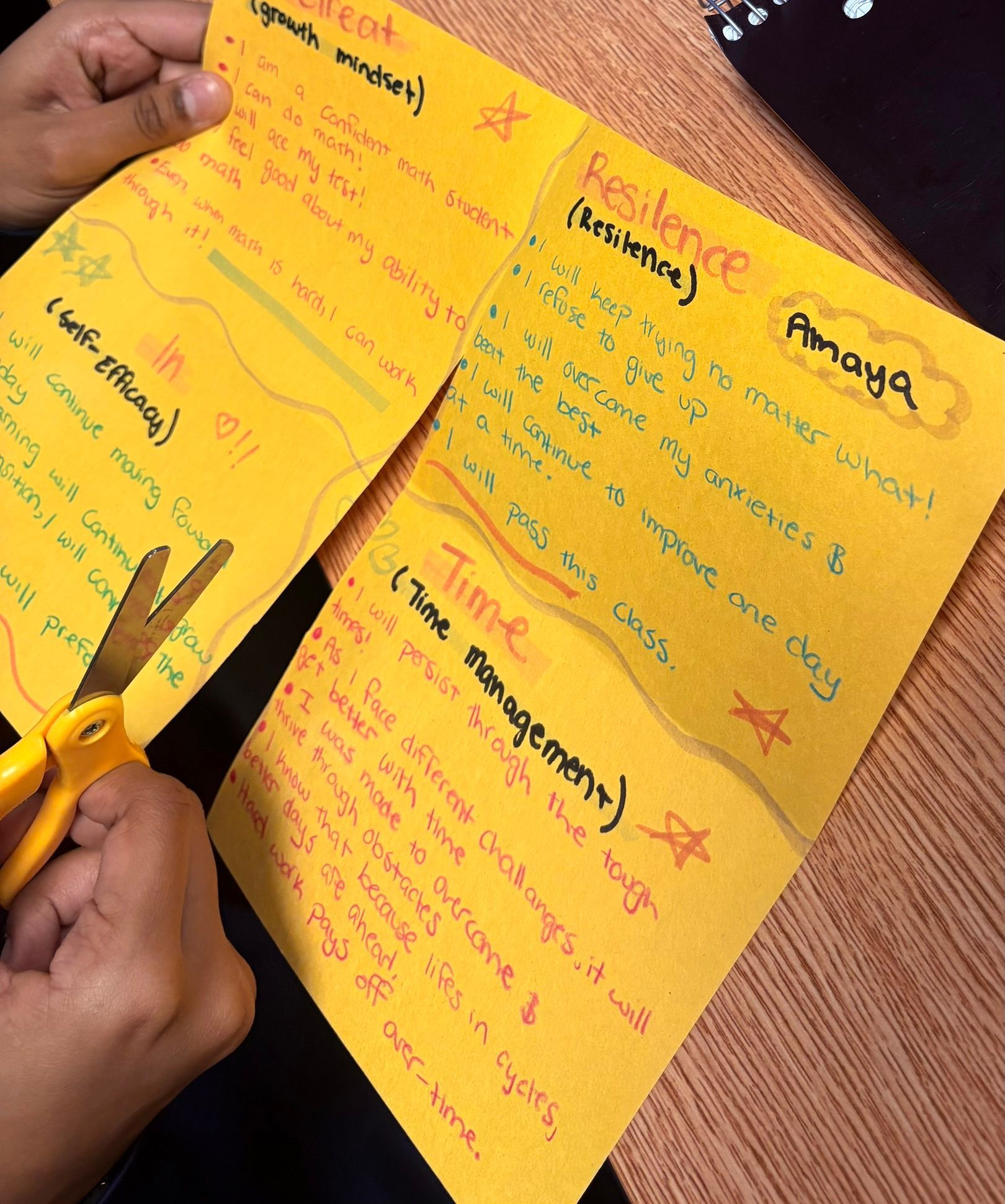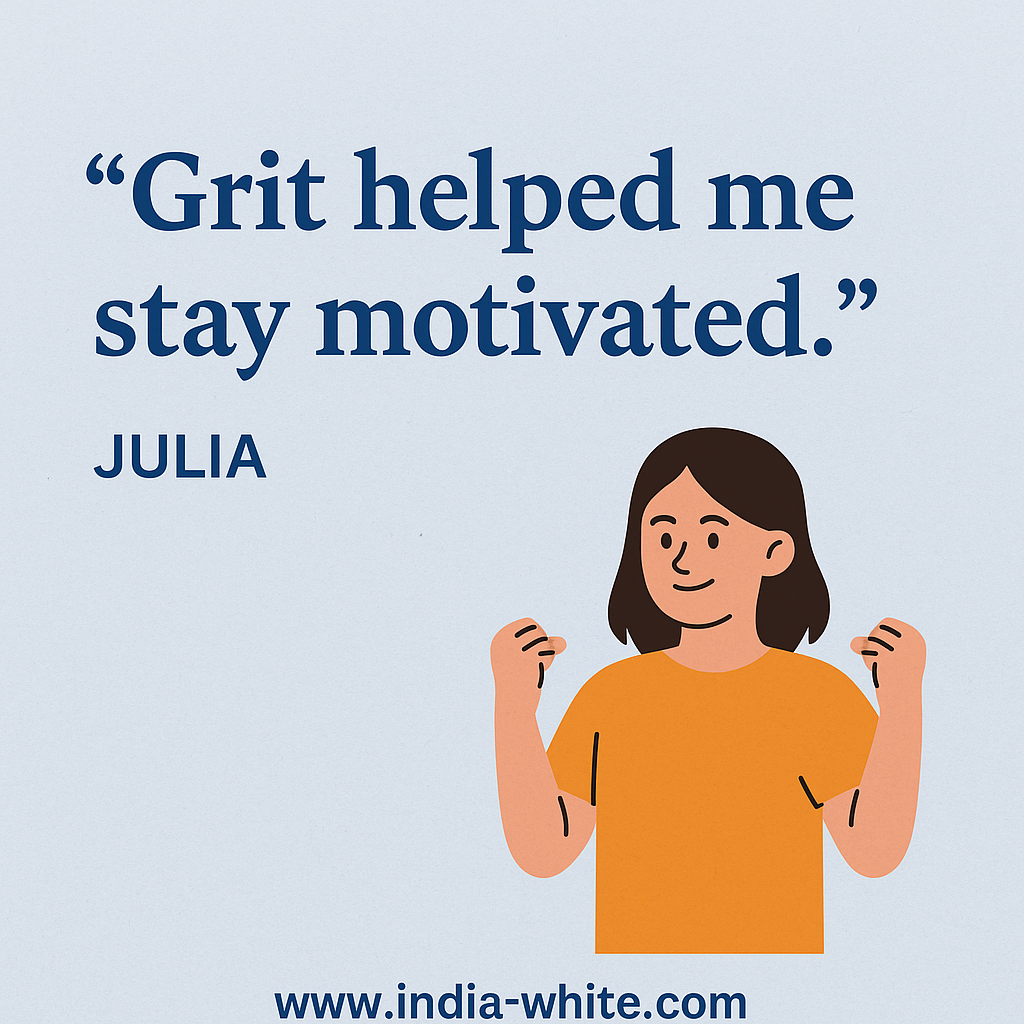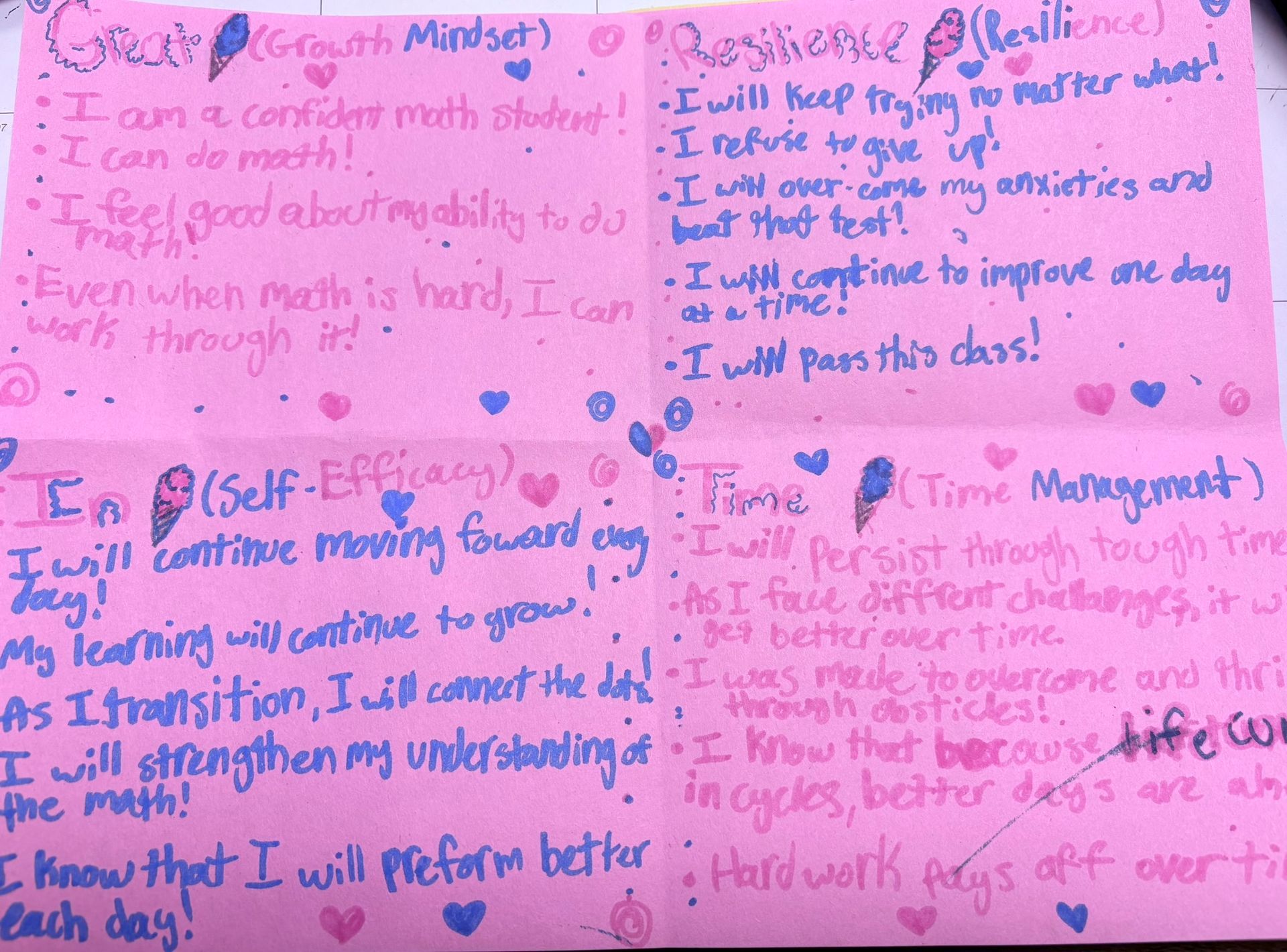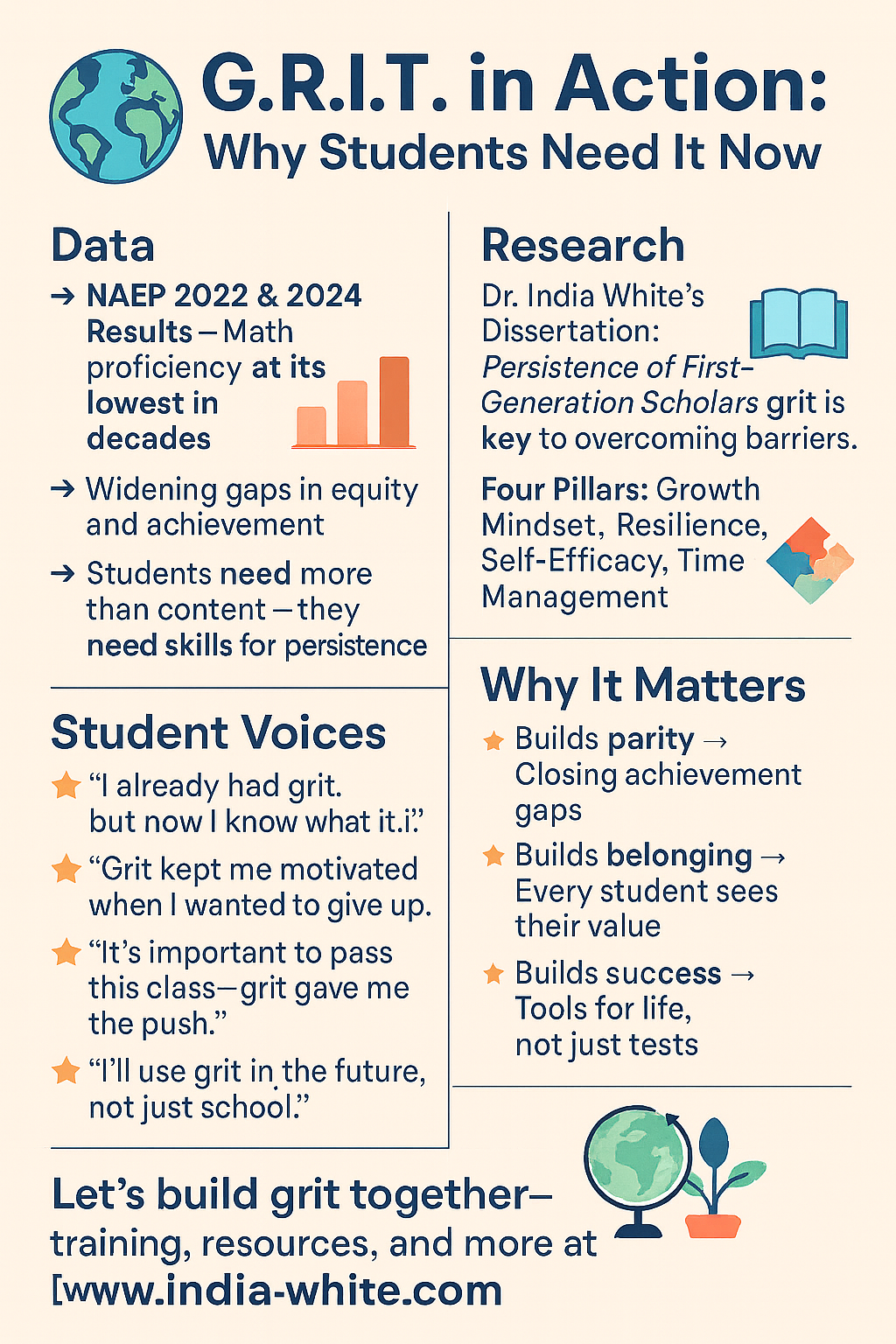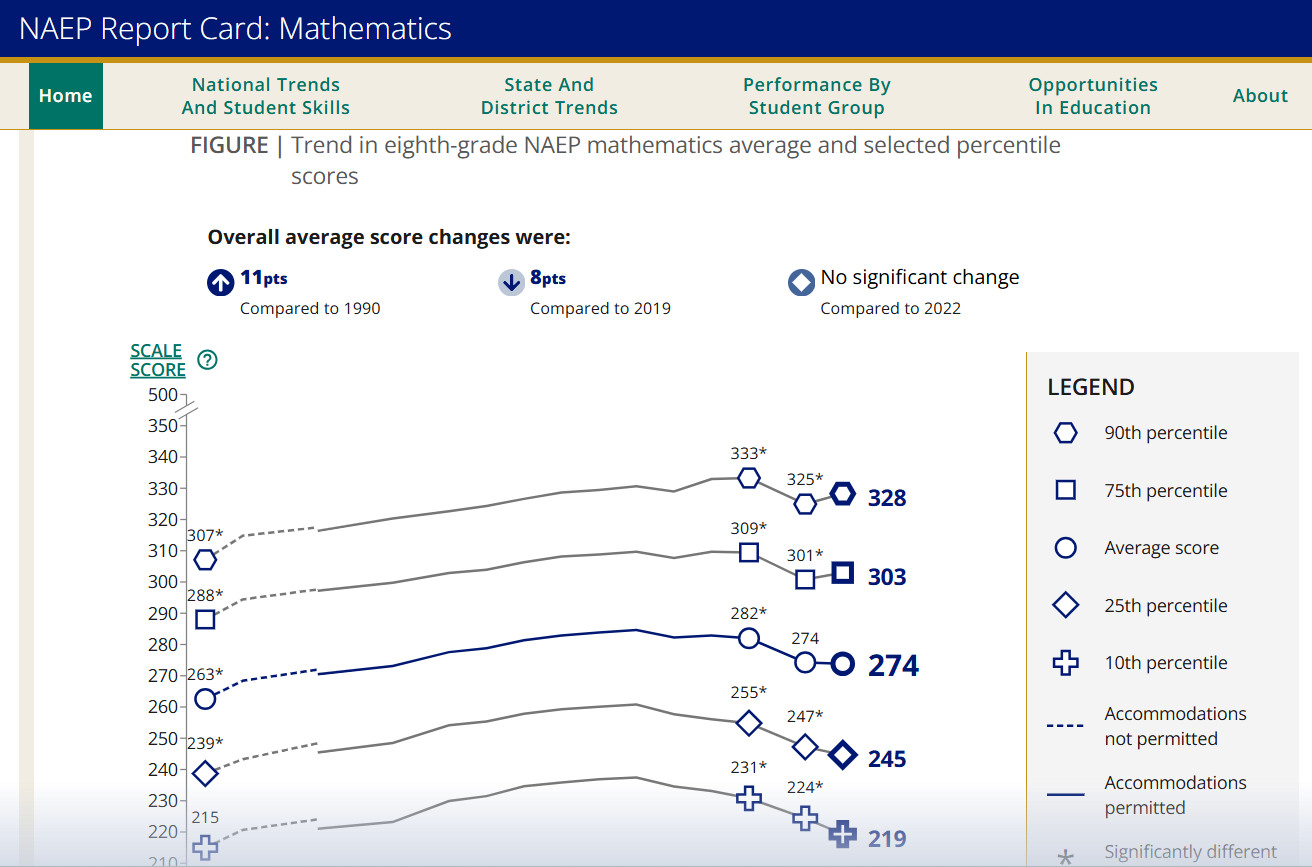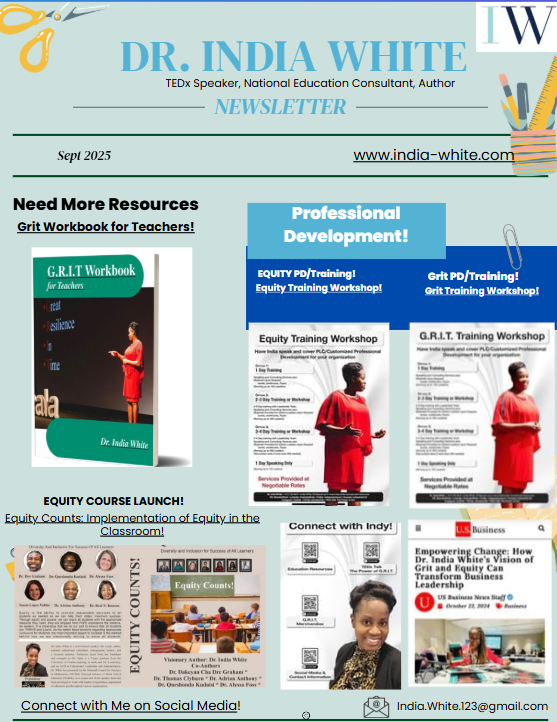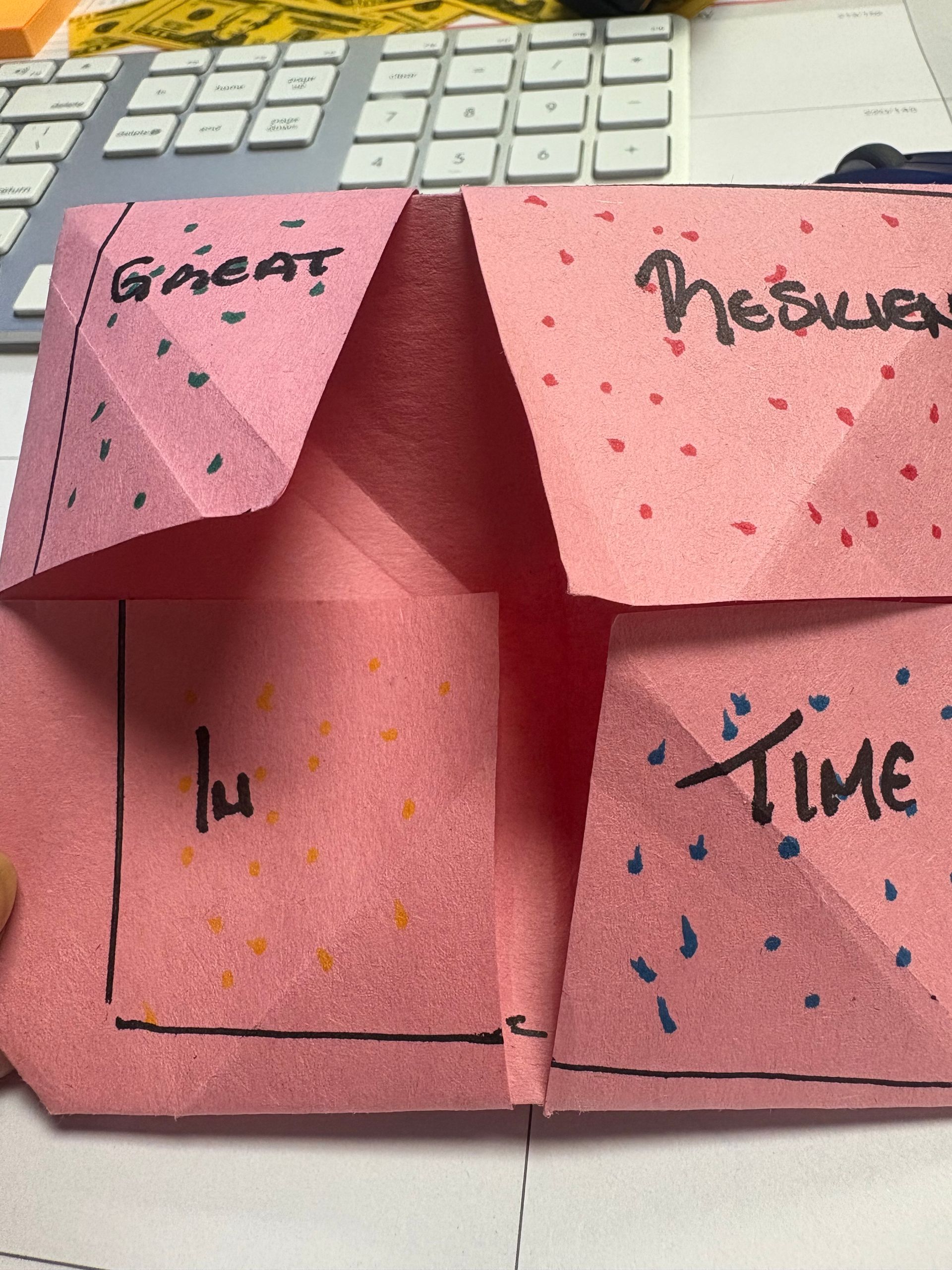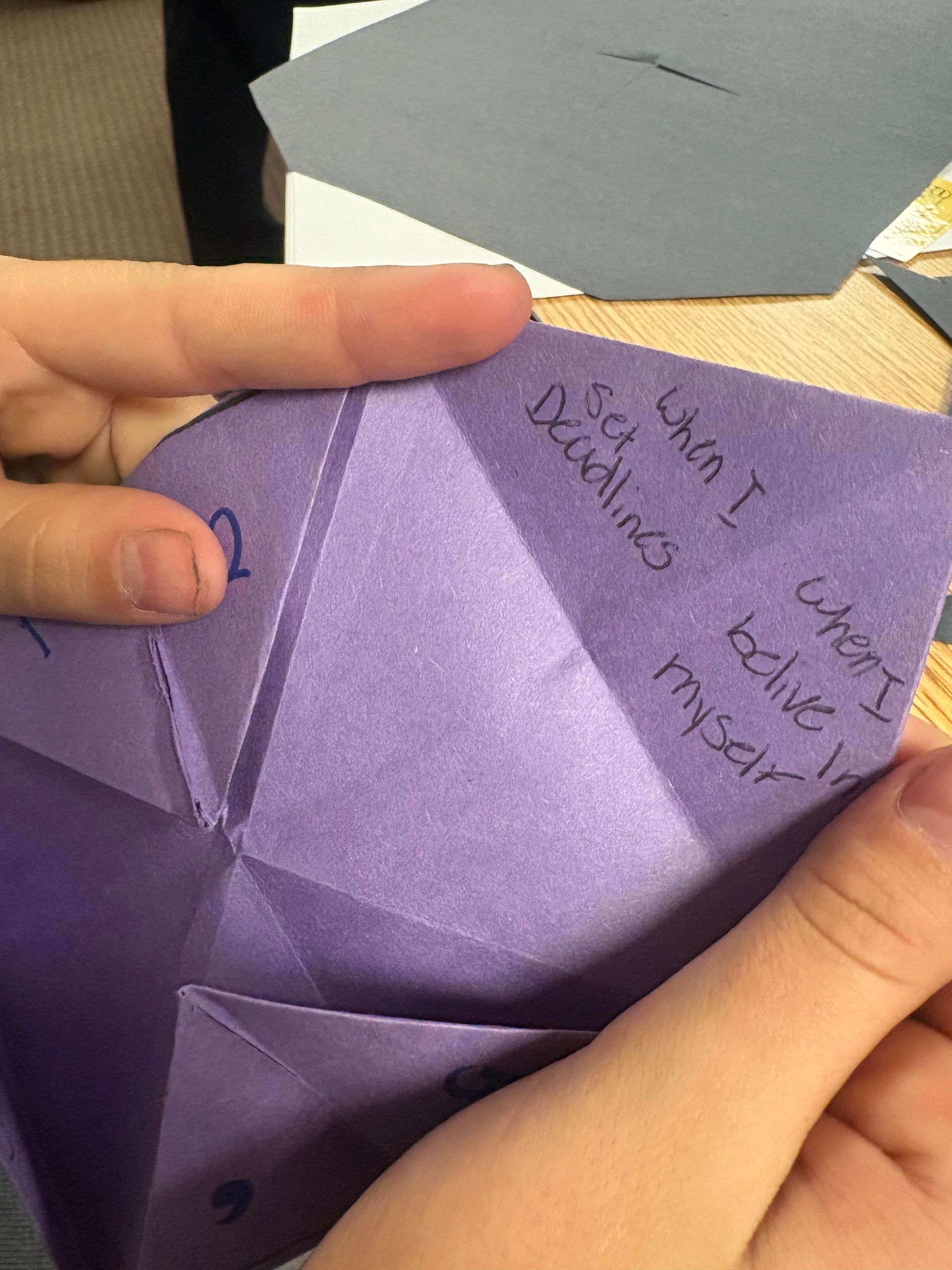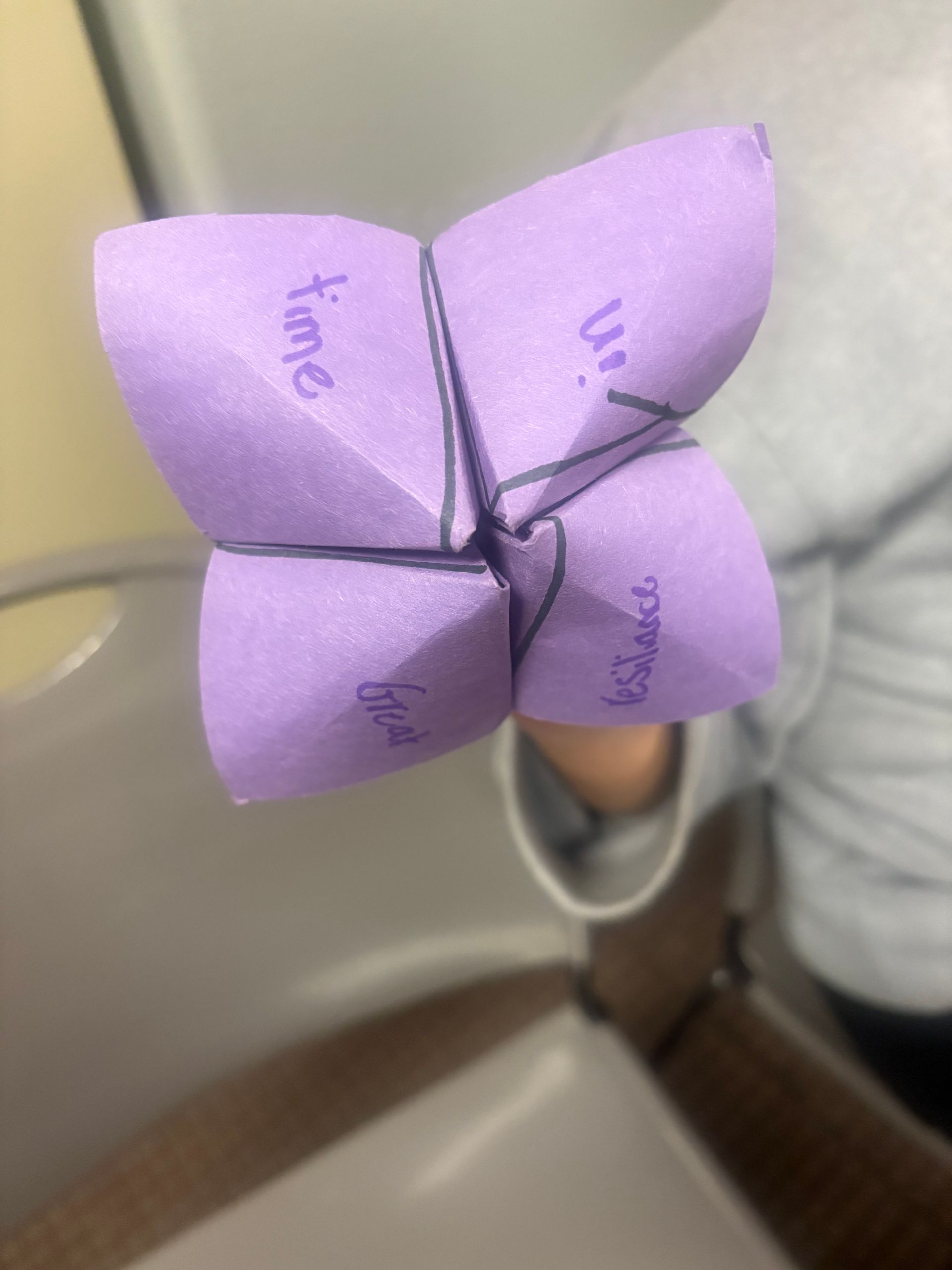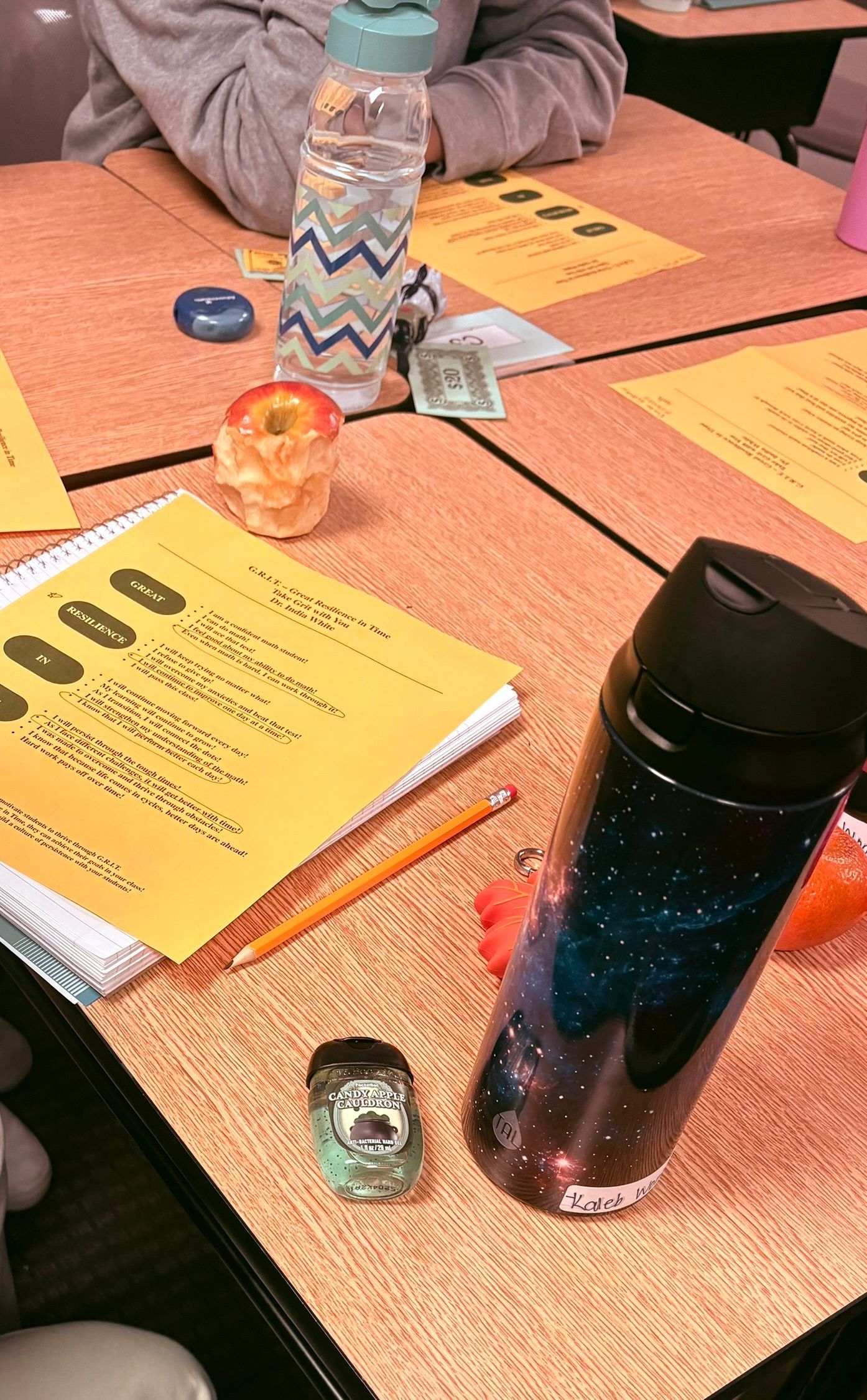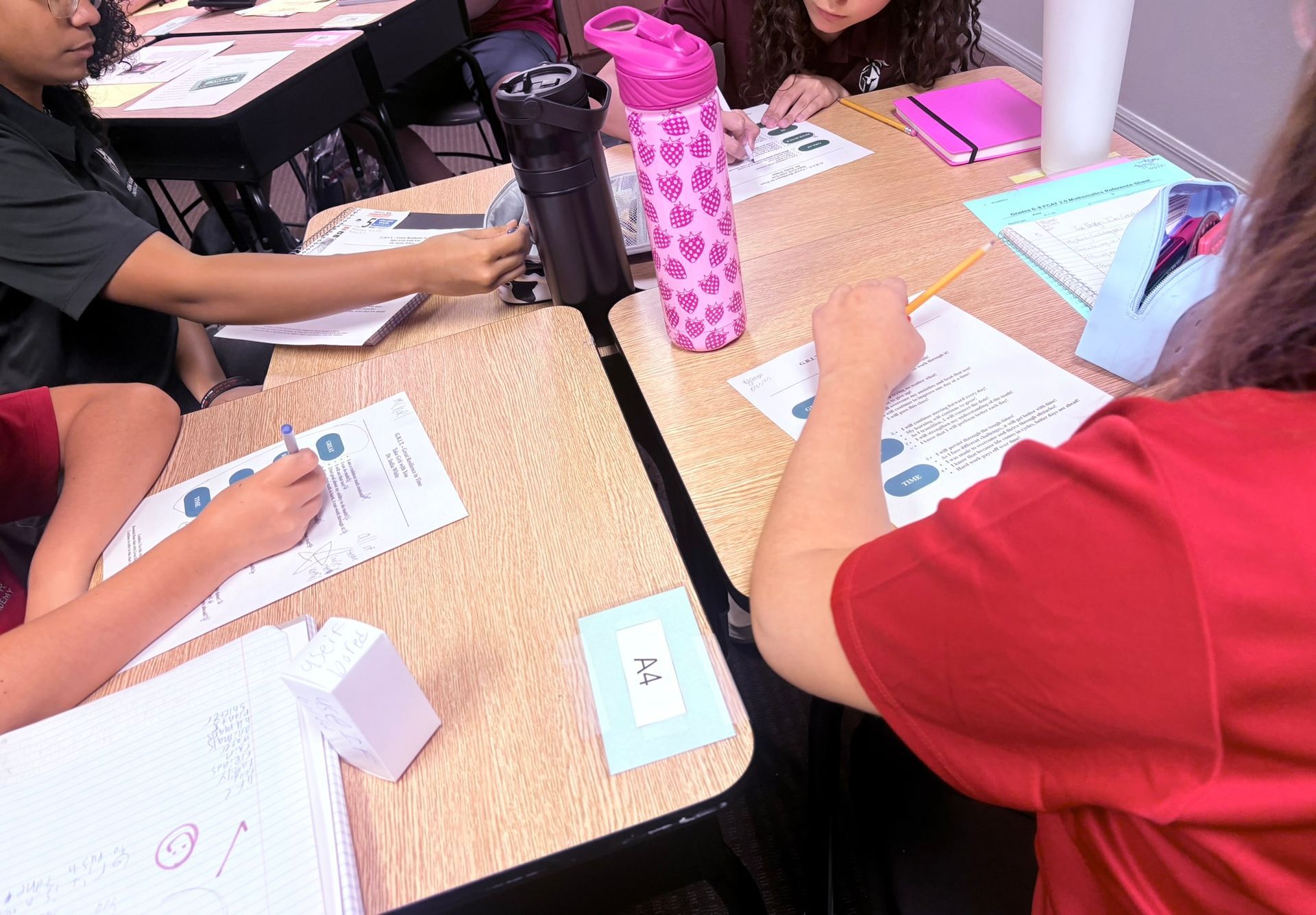Making Parity and Belonging Work in the Math Classroom!
India White • September 17, 2025
Making Parity and Belonging Work!

Making Parity and Belonging Work in the Math Classroom: Strategies for Educators
Creating a classroom environment where all students feel a sense of parity and belonging is crucial for fostering academic success, particularly in mathematics. This not only enhances students’ engagement but also contributes to improved learning outcomes. Drawing on recent research and the grit framework (Growth Mindset, Resilience, Self-Efficacy and Time Management), educators can implement several practical strategies to make parity and belonging work effectively in their math classrooms.
Understanding Parity and Belonging
Parity refers to the equitable treatment of all students,
providing equal opportunities for success regardless of their backgrounds. Belonging, on the other hand, is about cultivating an inclusive atmosphere where students feel accepted and valued. When students experience both parity and belonging, they are more likely to exhibit grit—the perseverance and passion for long-term goals—which is essential for overcoming challenges in mathematics.
Tips for Fostering Parity and Belonging in Math Classes
Here are 10 actionable strategies that educators can implement to cultivate parity and belonging in their mathematics classrooms:
1. Integrate Diverse Mathematical Perspectives:
-Incorporate mathematicians and mathematical contributions from various cultures into your curriculum. This not only validates diverse identities but also enhances students' understanding of mathematics as a universal discipline. For example, explore the contributions of Arab mathematicians to algebra or the use of geometry in ancient African cultures. As educators integrate diverse perspectives, student belonging levels increase and students feel like their opinions matter during mathematical discourse.
2. Use Real-World Applications:
- Connect math concepts to real-life situations that resonate with students' experiences. For instance, when teaching percentages, you might analyze data related to local economic issues or community projects, allowing students to see the relevance of math in their lives (Ladson-Billings, 1994). As students are able to make these connections along with completing culturally relevant math tasks, the math will come alive and students will develop an intrinsic motivation for learning new content in their class.
3. Create Collaborative Learning Environments:
- Encourage group work and collaborative problem-solving. This fosters a sense of community and belonging as students learn to rely on and support one another. By leveraging diverse strengths within groups, educators can create an inclusive atmosphere that encourages engagement and perseverance (Vygotsky, 1978). This also helps clear up any misconceptions students might have about their ability to comprehed the math they are learning along with strengthening student voice during instruction.
4. Focus on Growth Mindset:
- Reinforce the idea of a growth mindset by celebrating effort and resilience. Highlight stories of famous mathematicians who overcame challenges. Use language that emphasizes improvement and learning from mistakes, which helps students develop grit. Research shows that students with a growth mindset are more likely to persist in the face of difficulties (Dweck, 2006). Further, through a growth mindset, students will become naturally resilient while building the inner fortitude needed to persist. Further, they will increase in their self-efficacy levels, believing that they CAN do math.
5. Implement Culturally Relevant Pedagogy:
- Teachers should consider tailoring teaching methods to reflect the cultural backgrounds of their students. This can involve using culturally relevant examples in math problems or incorporating students' experiences into lessons. Culturally relevant pedagogy fosters a connection between math and students’ lives, enhancing their engagement (Gay, 2000). Further, this boosts inspiration and motivation levels, and contributes to strengthening teacher-student and peer relationships.
6. Encourage Individual Goal Setting:
- Have students set personal academic goals related to their math learning. This practice promotes ownership of their education and encourages them to take responsibility for their progress, reinforcing their sense of belonging and engagement. Use the grit framework to support students in understanding their motivations for setting these goals. Furhter, combine the grit framework with positive affirmation grit statements to boost students' perspectives on grit along with their grit levels in every category of the framework.
7. Provide Constructive and Timely Feedback:
- Offer regular, specific feedback that focuses on individual strengths and areas for growth. This approach not only supports learning but also helps students feel valued and understood. Personalized feedback fosters a positive learning environment and encourages persistence (Wang & Degol, 2013). As students persist, they will work on honing in on their mathematical abilities while becoming more efficent in math and their ability to express themselves in the math classroom.
8. Use Varied Assessment Methods:
- Employ diverse assessment methods that allow all students to demonstrate their understanding. This could include projects, presentations, and creative assignments in addition to traditional tests. Varied assessments cater to different learning styles and abilities, promoting equity in demonstrating mastery of concepts. Further, this speaks to each students' learning styles for better instructional delivery.
9. Create a Safe Learning Environment:
- Establish classroom norms that promote respect and acceptance. Encourage students to share their thoughts and ideas without the fear of judgment. A safe learning space allows students to take risks in their learning, which is vital for developing grit and resilience. As this happens, math anxiety will be replaced with a confident student who believes in themselves and can recognize their math identity.
10. Foster Relationships with Families:
- Engage with students’ families and communities to create a supportive network that reinforces the values of parity and belonging. Family involvement can positively impact student motivation and achievement, creating a partnership that supports students’ educational journeys. This helps keep everyone invovled and abreast as each leader contributes to building the whole child.
Conclusion
Implementing strategies to foster parity and belonging in math classrooms is essential for creating an inclusive environment where all students can thrive. By embracing diverse perspectives, promoting collaboration, and reinforcing a growth mindset, educators can empower students to cultivate grit and resilience in their mathematical journeys. Adopting these practices not only enhances student engagement but also leads to improved academic outcomes and a lasting appreciation for mathematics. Parity and belonging is essential for every classroom and is the glue that holds learning together for all students.
References
1. Dweck, C. S. (2006). Mindset: The New Psychology of Success. Random House.
2. Gay, G. (2000). Culturally Responsive Teaching: Theory, Research, and Practice. Teachers College Press.
3. Ladson-Billings, G. (1994). The Dreamkeepers: Successful Teachers of African American Children. Jossey-Bass.
4. Vygotsky, L. S. (1978). Mind in Society: The Development of Higher Psychological Processes. Harvard University Press.
5. Wang, M.-T., & Degol, J. L. (2013). Academic Perseverance: Antecedents and Consequences. Educational Psychologist, 48(3), 185-195.

Coming Full Circle: Returning to Sarasota with Gratitude and G.R.I.T. I am filled with gratitude and emotion as I prepare to return to Sarasota; not just as a speaker, but as someone whose life was forever changed by the generosity, vision, and grit of this community. Many years ago, I stood on the other side of opportunity as a formerly homeless teen, supported by scholarships made possible by leaders and organizations—many of whom will be in the room when I return. Those investments were not just financial; they were votes of confidence. They said, “We see you. We believe in your future.” And that belief changed everything. To now come back and say thank you; not in words alone, but through purpose-driven work—is truly humbling. Honoring a Legacy of Advocacy and Impact This moment is especially meaningful as we continue the legacy of Rep. Detert, a tireless advocate for students, education, and formerly homeless youth like myself. Her leadership embodied what it means to pair policy with compassion and action with accountability. She didn’t just talk about equity—she fought for it. That legacy lives on in the leaders, educators, and community members who refuse to let circumstance define a child’s future. The G.R.I.T. of This Organization What stands out most about this organization and its leaders is their impeccable G.R.I.T.**—growth mindset, resilience, self-efficacy, and time invested wisely in people. This is not performative work. This is long-haul, legacy-building leadership. You don’t just open doors—you walk alongside young people until they’re strong enough to run through them. A Personal Thank You Returning to Sarasota is deeply personal. It is a reminder that when communities choose to invest in potential, the ripple effects last generations. I am living proof that grit grows when someone believes in you long enough to help you believe in yourself. Thank you for sowing seeds years ago. Thank you for continuing the work. And thank you for allowing me to return—not just to speak, but to honor a legacy that helped shape my life. This is full circle. And we’re just getting started. 💙

Grit Meets AI: Reflections from the Florida Distance Learning Association Conference This past week, I had the absolute pleasure of presenting at the Florida Distance Learning Association Conference, and I’m still energized by the conversations, questions, and passion I witnessed from professors and K–12 educators across the state and beyond. My session focused on G.R.I.T. and Artificial Intelligence in the math space (Grades K–12); and more importantly, how we can responsibly and intentionally use AI to strengthen learning rather than replace good teaching. G.R.I.T. + AI = Powerful Instruction During the session, I shared how my G.R.I.T. framework, Growth Mindset, Resilience, Self-Efficacy, and Time Management, can serve as a guardrail for AI integration in mathematics. AI is not here to do the thinking for* students; it’s here to help students think better. We explored how AI can: * Support productive struggle rather than shortcut it * Differentiate instruction while maintaining high cognitive demand * Build student confidence through feedback and reflection * Help teachers reclaim time without sacrificing rigor From elementary number sense to secondary algebra and beyond, AI—when paired with grit—becomes a powerful ally in equity-centered math instruction. A Call to Professors and Teachers Whether you teach future educators at the university level or students in a K–12 classroom, my encouragement is this: don’t fear AI—frame it. When grounded in pedagogy, purpose, and perseverance, AI can help us close gaps instead of widening them. If you’re preparing teachers, now is the time to model what ethical, effective, and gritty AI use** looks like in practice. Let’s Stay Connected If this message resonates with you, I invite you to continue the work with me: * 📘 Explore my books and G.R.I.T. resources designed for educators and leaders * 🎤 Book me to speak or lead professional learning for your school, district, or conference * 🌐 Visit my website for tools, courses, and upcoming events Together, we can ensure that innovation never outpaces intention—and that grit remains at the heart of learning in every classroom, whether in person or online. Let’s get gritty. Let’s get intentional. And let’s lead the future of math education—wisely and boldly. 💪📊🤖
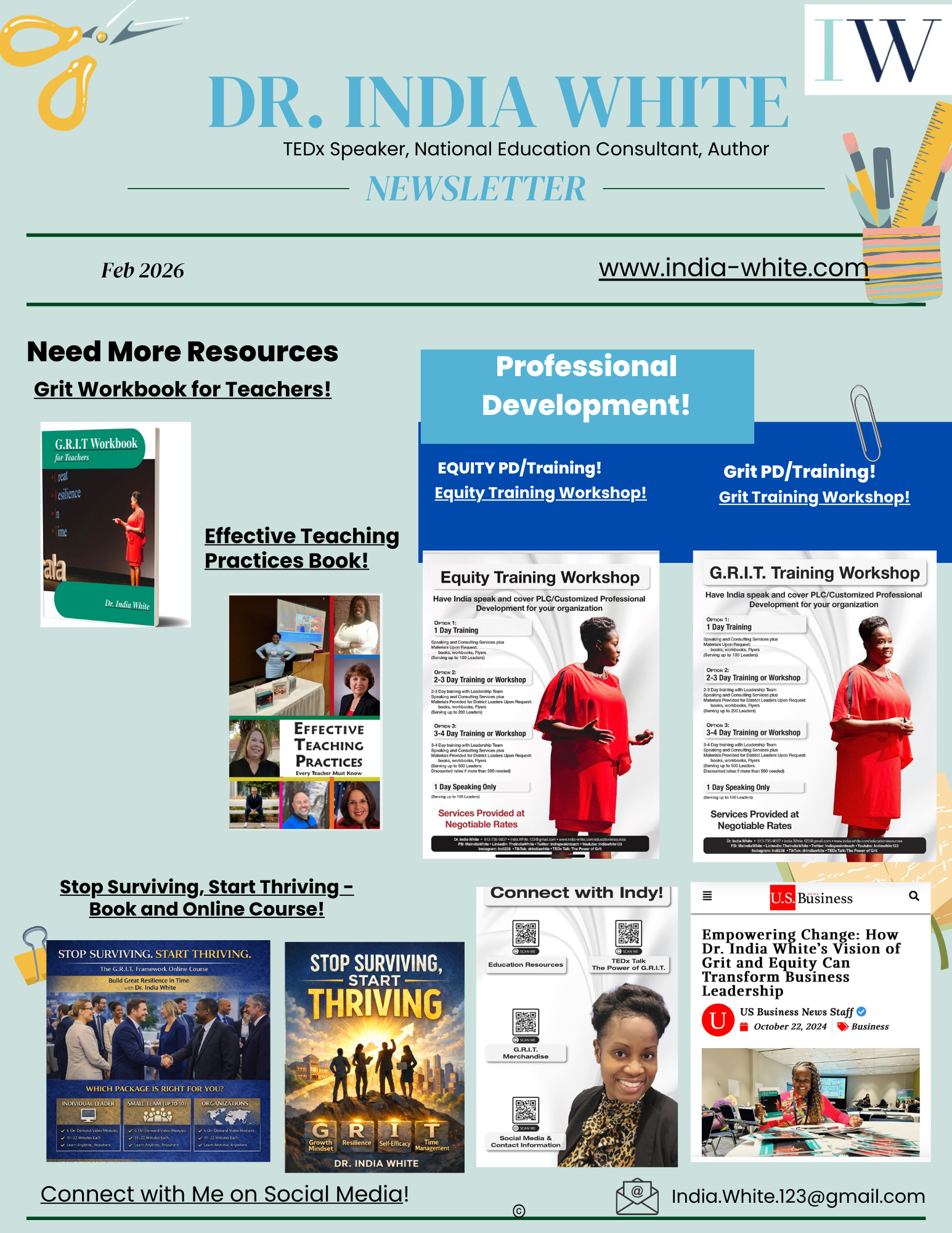
February Energy, Connection, and Celebration—Our Newsletter Is Live! 🎉 I’m so excited to share our February Newsletter, and whew—what a month it has already been! February has been full of learning, laughter, inspiration, and powerful connections, all while we celebrate Black History Month and continue the work of building equity and excellence in education. One of the biggest highlights this month was presenting aUtah Council of Teachers of Mathematics (UCTM)**. Connecting with educators in person in Utah was such a joy. The energy in the rooms, the thoughtful questions, the shared commitment to students—it reminded me why I love this work so much. Teachers showed up curious, gritty, and ready to grow, and I left feeling deeply encouraged. At the same time, I had the opportunity to connect with educators online through Florida Distance Learning Association (FDLA), and let me tell you—virtual spaces can be just as powerful! Engaging with teachers across distances, sharing ideas, and learning together in real time was an absolute blast. Whether in Utah or online, the common thread was clear: educators are hungry for tools that help students thrive. And February isn’t slowing down yet! I’m counting down the days as I prepare to serve as a keynote speaker for the Junior League of Sarasota at the end of the month. I’m truly honored and excited to share space with leaders who are committed to impact, service, and community transformation. This month’s newsletter captures all of that momentum—where I’ve been, what’s coming next, and how we can stay connected. If you haven’t checked it out yet, I invite you to take a look, share it, and reach out. Let’s collaborate, dream big, and keep building together. February is reminding me that connection fuels purpose—and I’m grateful for every educator, leader, and partner walking this journey with me. Let’s keep celebrating, learning, and getting gritty—together. 💛✨
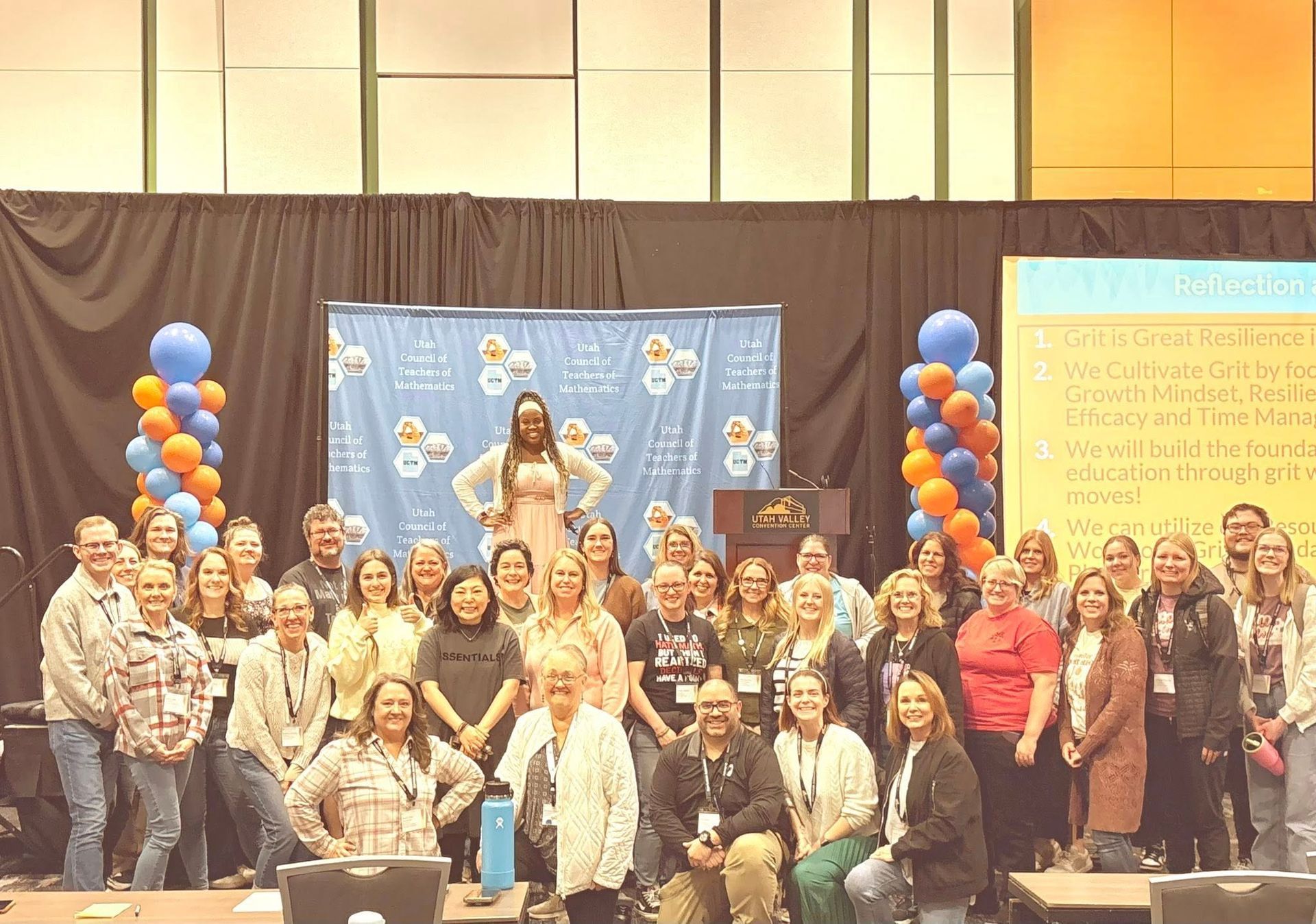
🌟 What an ABSOLUTELY PHENOMENAL time at UCTM presenting on grit games! 🎉 The educators in Utah are truly AMAZING! I feel so blessed to share insights on grit and connect with new friends—cheering each other on to get pumped up again! 💪✨ Had a hilarious time trying to throw hoops with Dan (I only made ONE shot—let’s just say my accuracy needs some work! 😂🏀). It was fantastic to connect with such inspiring friends and leaders in the math community, sharing exciting updates that Savvas has for all the math teachers out there! 📚🔍 BIG shoutout to the UCTM board, Jackie, the Savvas team, and all the incredible Utah educators! Thanks for a blast of a time! 🚀🙌 #GritAndGames #UpliftEducators #MathMagic #ConnectAndInspire #SavvasUpdates #FunInEducation ✨❤️ (I don’t own music copyright)
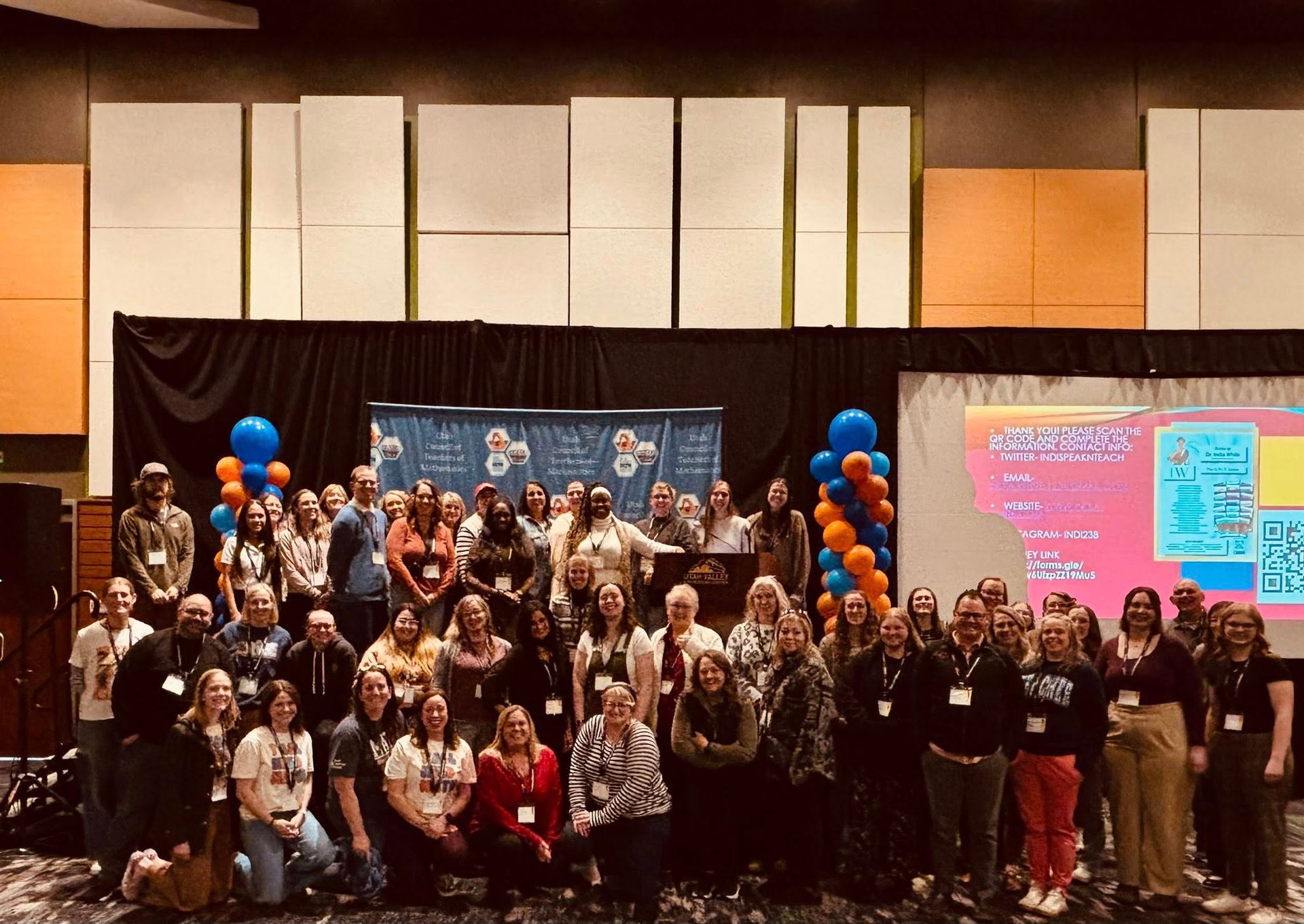
I am incredibly grateful for the opportunity to speak at UCTM 2026. The energy in the rooms was powerful, and several sessions were filled with educators eager to grow, reflect, and strengthen their practice—especially during my session on building gritty thinking in the classroom. Experiences like this remind me why this work matters so deeply. Teachers came ready to engage in meaningful conversations about productive struggle, perseverance, and how to move beyond surface-level engagement into true student thinking. One of the highlights was hearing how excited educators were about the new Savvas math books and the way these resources support conceptual understanding, collaboration, and confidence for learners at all levels. When curriculum, instruction, and mindset align, we truly begin to bridge the gap for students. At the heart of these conversations was the powerful connection between Thinking Classrooms and my G.R.I.T. Framework—Growth Mindset, Resilience, Self-Efficacy, and Time Management. Together, they create learning environments where students don’t just solve problems, they learn how to persist, reflect, and believe in themselves. Building grit starts with a growth mindset. In a thinking classroom, struggle is not a setback—it’s evidence of learning. Teachers can normalize this by celebrating multiple strategies, modeling mistakes, and using language that reframes being “stuck” as part of the thinking process. When students understand that effort and revision are expected, they engage more deeply and take greater ownership of their learning. Resilience grows through collaboration. Thinking classrooms thrive when students work together, share ideas, and wrestle with concepts as a team. Random grouping, structured roles, and intentional math discourse help students learn that perseverance is strengthened in community. When learners support one another, they build confidence and stamina to tackle challenging tasks. Self-efficacy develops when student thinking is valued. Using vertical non-permanent surfaces like whiteboards lowers the fear of making mistakes and encourages risk-taking. Asking students to explain their reasoning and highlighting their ideas—whether complete or still developing—signals that their thinking matters. Over time, students begin to see themselves as capable mathematicians. Time management is another critical component of grit. Teachers can support this by breaking tasks into phases, using visual timers, and guiding students to reflect on how they used their time. These habits help students learn to pace themselves, stay focused, and persist through complex problems—skills that extend far beyond the math classroom. The questions we ask also shape gritty thinking. Instead of rescuing students, we can ask questions that prompt reflection and strategy: What do you already know? What have you tried so far? What could you try next? These questions keep students engaged in the process and strengthen their independence as thinkers. Finally, reflection brings it all together. Ending lessons with opportunities for students to reflect on effort, strategies, and moments of perseverance reinforces that grit is just as important as correctness. When we celebrate persistence as much as achievement, students learn that growth happens over time. UCTM 2026 was a powerful reminder that educators everywhere are committed to creating classrooms where students feel supported, challenged, and empowered. I am grateful for every teacher who showed up ready to learn, collaborate, and push their thinking. Let’s stay gritty, keep learning together, and continue bridging the gap so every learner has the opportunity to thrive.
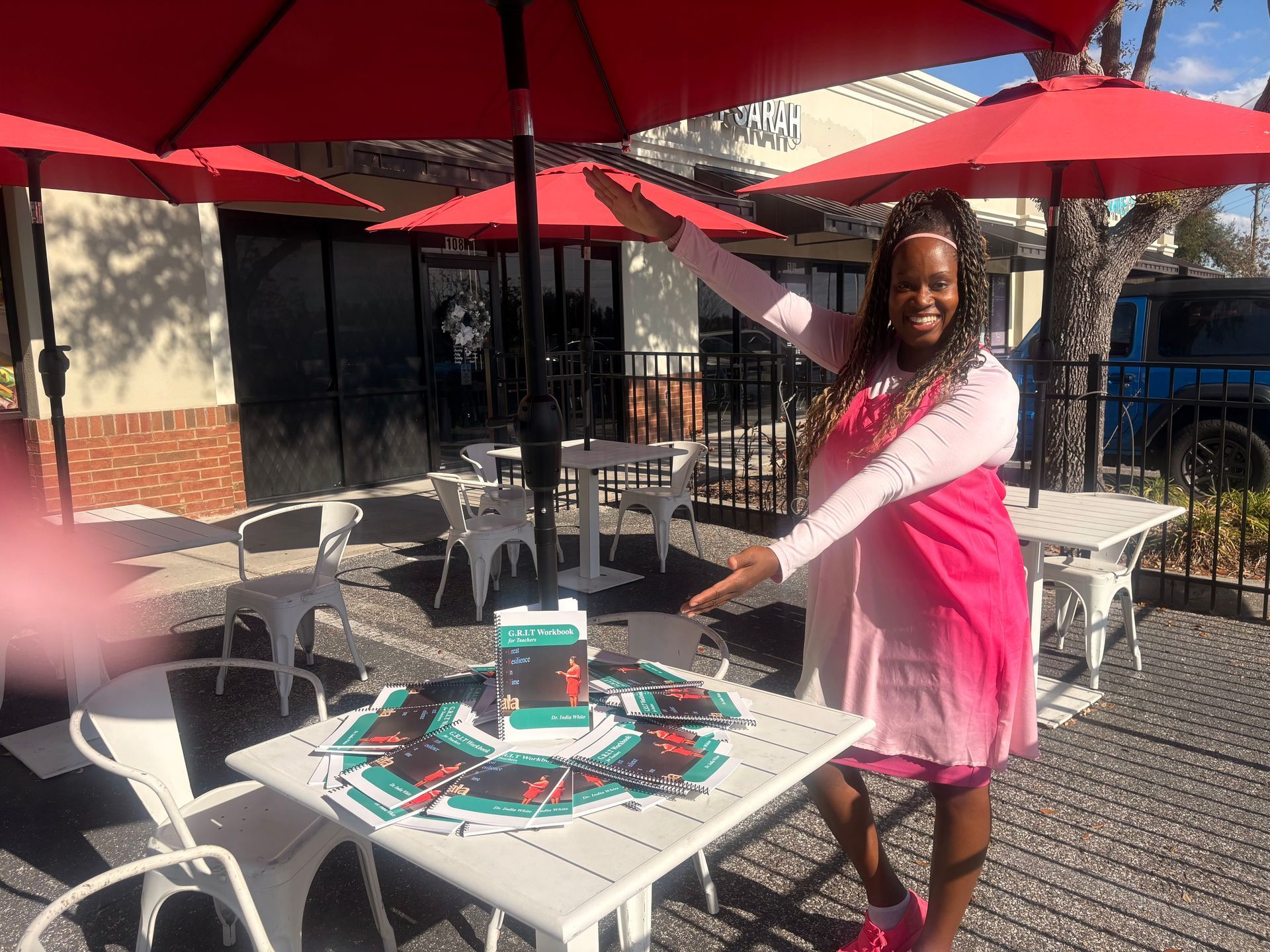
🎉 Exciting news, teachers! 🎓✨ I’m gearing up for an amazing trip to UCTM, and I want YOU to join the fun! Don’t forget to check out my latest video where I reveal some fantastic door prizes that could be yours! 🎁🙌 Let’s connect, learn, and make unforgettable memories together. Click the link and find out how you can win! 🚀💼 👉✨ #UCTM2026 #TeachersRock #drindiawhite #nabse @#foryou (I don’t own copyright to music ) Let’s make this an event to remember! 🙏🎉

It’s Official! The 60-Day Weight Loss & G.R.I.T. Discipline Reset Has Launched 🎉 I’m excited to officially announce the launch of my newest transformational experience—the 60-Day Weight Loss & G.R.I.T. Discipline Reset! This course has been thoughtfully designed for individuals who are ready to stop starting over and finally build the discipline, consistency, and mindset needed to see lasting results. Led by Dr. India White, this 8-week online course goes beyond traditional weight loss programs. It focuses on sustainable change through my proven G.R.I.T. Framework: Growth Mindset, Resilience, Self-Efficacy, and Time Management. This isn’t about extremes or quick fixes—it’s about building habits that fit real life and last well beyond 60 days. What’s Included Participants receive access to: * An introductory video to reset your mindset and set clear expectations * Eight weekly modules that build discipline step by step * A conclusion video to help you transition from a reset to a lifestyle Each week is intentionally structured to help you strengthen both your body and mind, so progress doesn’t disappear once motivation fades. Why This Course Works So many weight loss programs focus only on what to eat or how to exercise—but they ignore the mental discipline required to stay consistent. This course fills that gap. You’ll learn how to: * Stay resilient during setbacks * Manage your time realistically * Build confidence through small, sustainable wins * Create routines that work even on busy days To deepen the experience, I highly encourage participants to pair the course with the 60-Day Weight Loss G.R.I.T. Workbook, available on Amazon. The workbook provides daily reflections, habit tracking, and accountability tools that align with each week of the course. Who This Course Is For This course is perfect for: * Individuals ready to lose weight with structure and purpose * Busy professionals, educators, leaders, and entrepreneurs * Fitness trainers and wellness professionals * Anyone seeking discipline, clarity, and long-term results Enroll Today If you’ve been waiting for the right time to recommit to your health, this is it. The 60-Day Weight Loss & G.R.I.T. Discipline Reset course is now live and ready for you. 👉 Click the link to purchase and enroll today 👉 Start your 60-day reset 👉 Build discipline that lasts a lifetime Your healthiest, most disciplined self is within reach—and G.R.I.T. is the bridge to get you there.
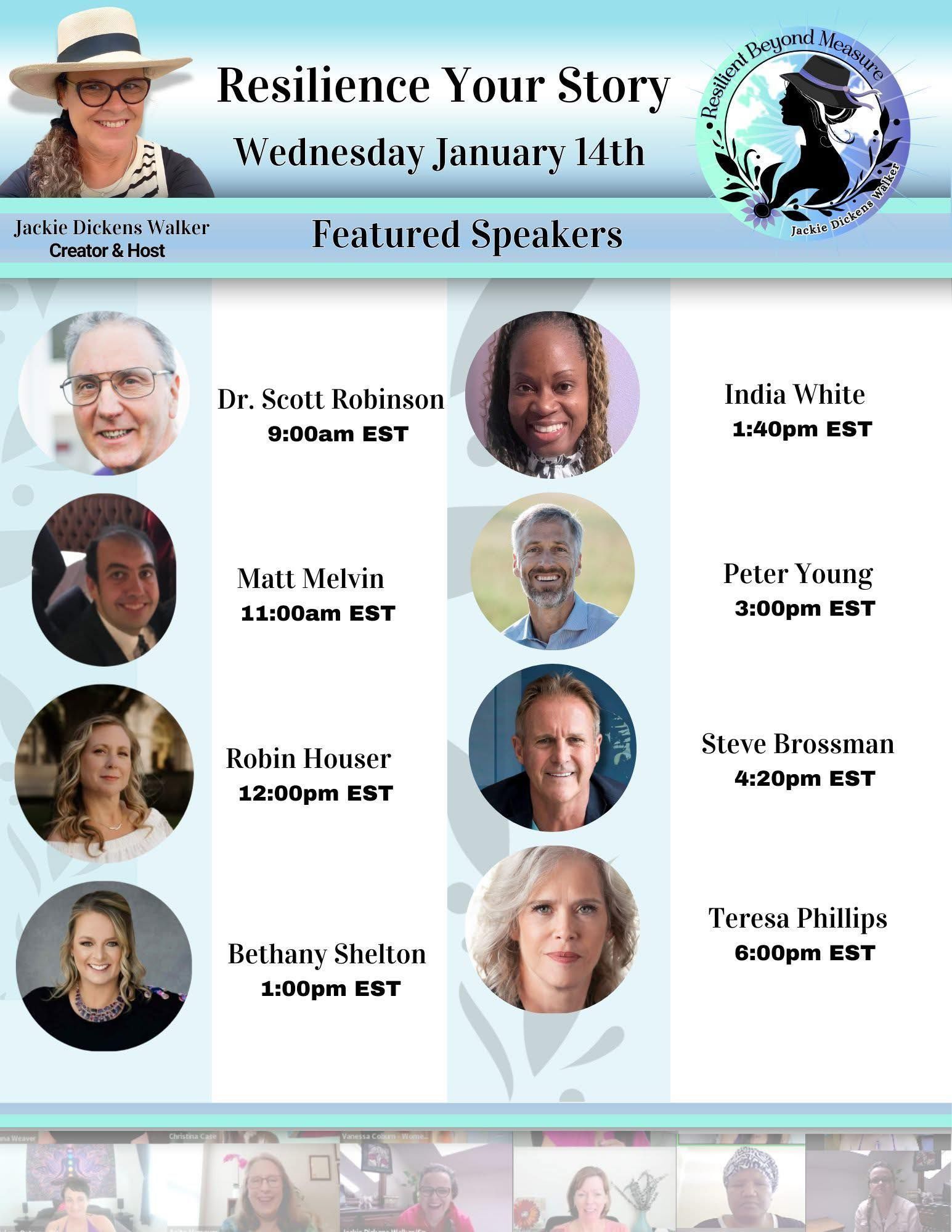
From Homelessness to Hope: Moving from Surviving to Thriving at Resilient Beyond Measure Serving as a keynote speaker at the Resilient Beyond Measure Conference was not only fun, it was deeply meaningful. The room was filled with leaders, educators, and purpose-driven individuals who were hungry for more—more clarity, more impact, and more hope. That collective energy reminded me why I continue to show up and share my story. During my keynote, I spoke candidly about my journey—one that did not begin on a stage, in a boardroom, or with titles behind my name. I shared how I once experienced homelessness, uncertainty, and moments where survival was the only goal. There were seasons when simply making it through the day felt like the win. Yet, through grit, faith, discipline, and relentless perseverance, that season did not define my destination. Today, by God’s grace and years of intentional work, I now serve as a math textbook author, educator, national speaker, and entrepreneur, helping impact millions of students, teachers, leaders, and organizations across the nation. My story is living proof that where you start does not dictate where you finish. At the heart of my keynote was a bold challenge: we must stop normalizing survival mode. Survival is reactive. Thriving is intentional. I shared my G.R.I.T. framework, which continues to be the foundation of my work and message: Growth Mindset — shifting from “I can’t” to “I’m learning” Resilience — developing the stamina to rise again and again Self-Efficacy — believing deeply that you are capable and equipped Time Management — aligning time with purpose, not pressure When these four pillars work together, individuals don’t just cope—they transform. One of the metaphors that resonated strongly with the audience was the idea that many of us are living and leading in low-level energy spaces, when we were designed for more. I described this as moving from survival-level “beta rays” toward higher levels of clarity and impact. Beta represents survival mode —stress-driven, reactive, exhausted, and constantly responding to emergencies. Alpha reflects stability and focus —calmer thinking, reflection, and clearer decision-making. Theta symbolizes creativity and deep connection —innovation, vision, and problem-solving begin to flourish. Gamma represents peak performance and transformation —high-level thinking, purpose, alignment, impact, and legacy. Thriving means intentionally moving away from beta-level survival and stepping into gamma-level living and leadership—where our actions are aligned with purpose, vision, and long-term impact. I want to extend my sincere thanks to Jackie Walker for the invitation and opportunity to keynote such a powerful conference. Resilient Beyond Measure created a space where authenticity, healing, and growth were not just encouraged—they were activated. It was truly an honor to serve and connect with such an inspiring community. I was also excited to share my newest book, Stop Surviving, Start Thriving, which expands on the message of the keynote and provides practical tools to help readers move from burnout to breakthrough. The book is accompanied by a new course designed to walk participants step by step through applying the G.R.I.T. framework in real life—not just reading about it, but living it. In addition, leaders are invited to explore the G.R.I.T. Workbook for Leaders, created to support sustainable leadership, confidence, resilience, and intentional growth. If this message resonates with you, I would love to stay connected. Visit my website at www.india-white.com to learn more about my work, speaking engagements, and resources. Both Stop Surviving, Start Thriving and the G.R.I.T. Workbook for Leaders are available today! Whether you are an educator, leader, entrepreneur, or someone simply ready for more, remember this: you were never meant to just survive. With grit, vision, and intention, thriving is not only possible—it’s your calling. With gratitude and grit, Dr. India White

EXCITING NEWS!! I am thrilled to share some incredible news with you all! After months of hard work and dedication, I am proud to announce the launch of my new book, "Stop Surviving, Start Thriving: A Grit Framework for Leaders." This book is designed to empower leaders like you with the insights and strategies needed to elevate your leadership journey and truly thrive in today’s challenging environment. What You’ll Discover in My Book In "Stop Surviving, Start Thriving," I delve into the grit framework that will help you harness your strengths, overcome obstacles, and lead with confidence. Whether you’re an established leader or someone just starting your journey, this book is filled with practical advice and actionable steps to make a meaningful impact. Why This Book Matters: - Transformational Insights: Learn how to shift your mindset from merely surviving to genuinely thriving in your role. - Practical Strategies: Gain access to tools and techniques that you can implement right away to enhance your leadership effectiveness. - Inspiration: Discover stories and examples that will motivate you to take your leadership to the next level. Introducing the Stop Surviving, Start Thriving Course! In addition to the book, I am thrilled to announce the launch of the Stop Surviving, Start Thriving Course! This course complements the book perfectly, providing you with an interactive experience to dive deeper into the concepts covered and gain practical tools that you can use in your daily leadership practice. What to Expect from the Course: - Interactive Learning: Engaging modules that challenge you to think critically and apply lessons to your leadership style. - Real-Life Applications: Practical exercises and discussions that make the concepts relatable and actionable. - Community Support: Join a network of like-minded individuals who are also on their journey to thrive! Where to Find the Book and Course You can grab your copy of "Stop Surviving, Start Thriving" on Amazon by following this link: Amazon Link ( https://a.co/d/c8BNlS9 ). 📖 For those eager to join the course, it's available on my website here: Stop Surviving, Start Thriving Course ( https://www.india-white.com/store/Stop-Surviving-Stop-Thriving-Online-Course-p657410057 ). 🌐 Join Me on This Transformative Journey! I am so excited about this new chapter and can’t wait for you to explore the book and course. Together, let’s stop surviving and start thriving! Your leadership journey begins now. Thank you for your continued support, and I look forward to hearing your thoughts on the book and the course! Let’s thrive together! 💥
